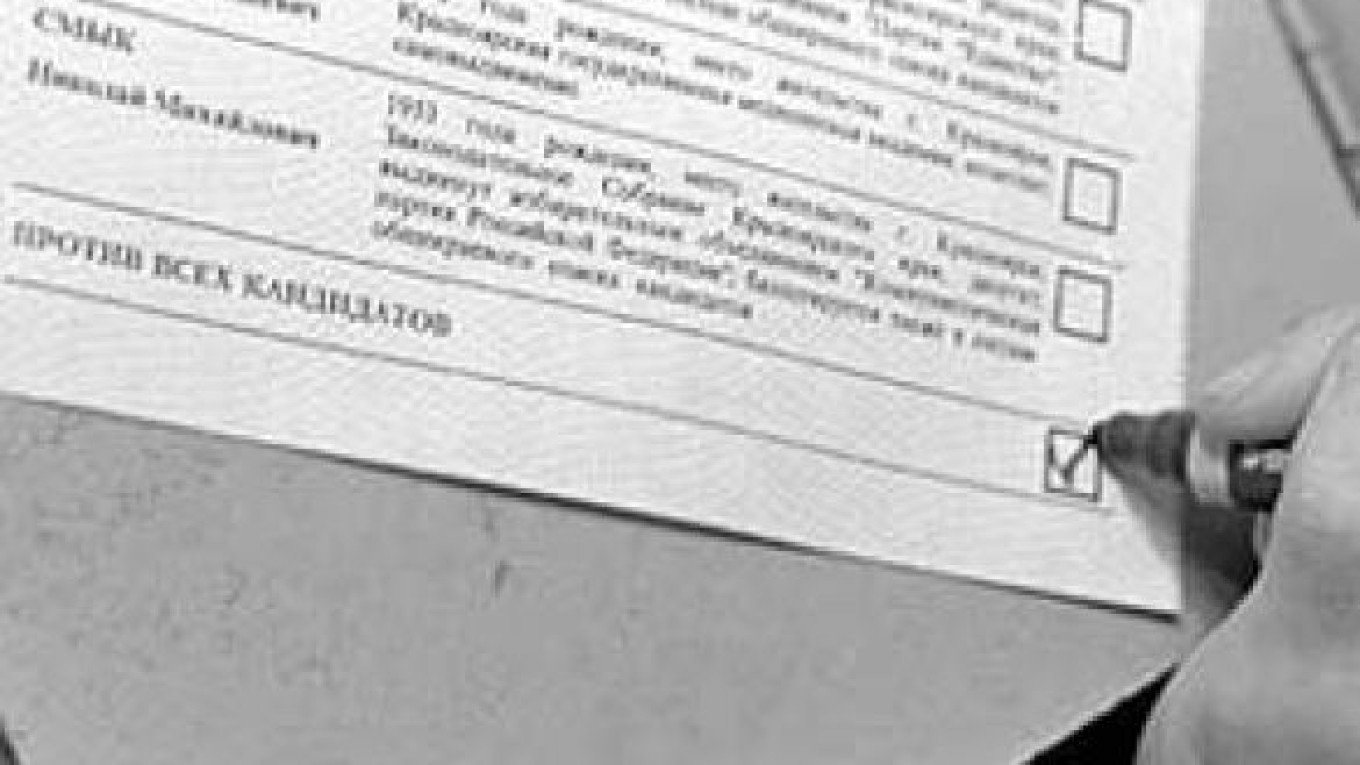The "against all" vote, a popular mechanism of protest until it was stricken from the Russian ballot in 2006, may soon reappear on the initiative of the very people who removed it — the ruling United Russia party.
Valentina Matviyenko, who is the Federation Council's Speaker and a United Russia member, said in a letter published by Izvestia that she will submit a draft bill to the State Duma on Wednesday for the reintroduction of the "against all" option.
The bill was prepared by Matviyenko and other members of the council, who believe that the return of the "against all" vote will "more fully reflect in the election process the diversity of political opinions, of public interests, which is characteristic of our country today," Matviyenko wrote.
If the Duma approves the bill, the "against all" vote will be added to ballots for all elections except for the presidential election.
"The president is the protector of the Constitution, he is endowed with various weighty powers, and if he didn't perform them the government and country would become simply incapable," Matviyenko wrote.
Prime Minister Dmitry Medvedev said in September that he was open to a discussion on the matter. "In principle I do not object to it, it could be of some use," Medvedev said in an interview with Rossia 24, adding that the question "demands further discussion."
The decision to push for the option to be restored may be hard to fathom, given that Matviyenko said as recently as 2011 that she did not believe its reinstitution could make elections more democratic, RIA Novosti reported.
"In returning the "against all" vote, the authorities can say that they are meeting opposition-minded citizens halfway. However, this option works against the opposition, eroding its electorate even further," Alexei Makarkin, deputy head of the Center for Political Technologies, in an interview with Expert.ru in September.
Some analysts have said that the return of "against all" could drain the opposition vote, as citizens who are against United Russia but not committed to another party would have a vehicle to express their discontent without choosing a specific political program.
However, others have pointed to chronically low voter turnout in recent years as a sign that former "against all" voters would rather avoid elections than vote for the opposition.
Meanwhile, Russia's leading opposition parties remain divided on the return of "against all."
The Communist Party's Sergei Obukhov said that the option might make sense in a balanced political system, but that in key regions where United Russia dominates, any votes for minor parties or "against all" can only secure the ruling party's control.
The Liberal Democratic Party's Igor Lebedev said that his party is against any further changes to election legislation, while A Just Russia's Alexander Burkov said that he supports the idea, but only if it is paired with the introduction of a minimum voter turnout threshold that elections would have to meet to be considered legitimate.
A Message from The Moscow Times:
Dear readers,
We are facing unprecedented challenges. Russia's Prosecutor General's Office has designated The Moscow Times as an "undesirable" organization, criminalizing our work and putting our staff at risk of prosecution. This follows our earlier unjust labeling as a "foreign agent."
These actions are direct attempts to silence independent journalism in Russia. The authorities claim our work "discredits the decisions of the Russian leadership." We see things differently: we strive to provide accurate, unbiased reporting on Russia.
We, the journalists of The Moscow Times, refuse to be silenced. But to continue our work, we need your help.
Your support, no matter how small, makes a world of difference. If you can, please support us monthly starting from just $2. It's quick to set up, and every contribution makes a significant impact.
By supporting The Moscow Times, you're defending open, independent journalism in the face of repression. Thank you for standing with us.
Remind me later.


